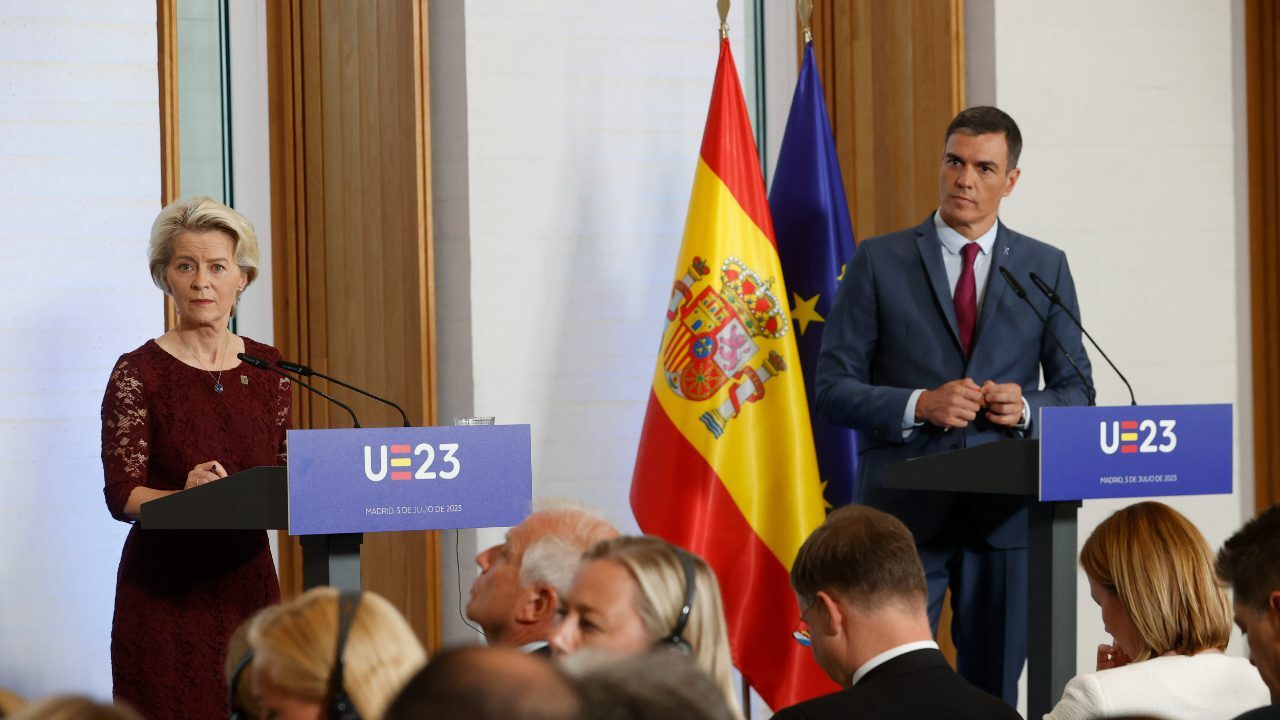
European Commission president Ursula von der Leyen (left) and Spanish Prime Minister Pedro Sánchez (right), at the official launch of the EU Council’s Spanish Presidency, July 3rd.
The European Union needs to reach an agreement on the stalled Migration Pact in the next six months, by the end of Spain’s term as the EU Council President, Spanish Prime Minister Pedro Sánchez said during a joint press conference with EU Commission chief Ursula von der Leyen in Madrid on Monday, July 6th, marking the new presidency’s official launch.
It’s not surprising that the Spanish presidency will put the Migration Pact high up on its agenda, considering that its controversial ‘solidarity mechanism’—forcing countries to choose between accepting refugees or paying €22,000 per migrant into a common EU fund—would mostly benefit the Mediterranean frontline countries: Italy, Greece, and Spain.
The Pact was originally intended to be finalized during last week’s EUCO Summit in Brussels, but even after two days of negotiations, Western member states were unable to get Poland and Hungary to lift their veto and achieve a common position, leaving the fate of the package in legislative limbo.
“I hope … we will be able to settle this major issue during this term,” PM Sanchez said during Monday’s press conference, meaning before the end of 2023. “For Spain, this would be significant and even symbolic from a political point of view … after years of migrant crises.”
For Warsaw and Budapest, the forced relocation of migrants is seen as a violation of their sovereignty, while the option of financial contributions is deemed as punishment for not doing so. Furthermore, by vetoing the Pact, the two Central European countries were also protesting the way it was initially approved: by qualified majority voting and not unanimity, disregarding individual interests and objections.
But during the Madrid event, both Sánchez and von der Leyen stressed that the decision was taken according to the treaties, whether they like it or not, and there was nothing left for Poland and Hungary but to accept it.
True, qualified majority voting or QMV—that needs only 15 member states who represent at least 65% of the EU’s population—is enshrined in the treaties, but they failed to mention that the EU has never taken such an important decision on migration in this way before, which is why no previous versions of the migrant redistribution scheme ever got past the Central European vetoes.
As Gladden Pappin, the President of the Hungarian Institute for Internal Affairs explained in his commentary for The European Conservative, the EU recently changed the decision-making procedure to allow an initial vote at the ministerial level using QMV, and only then presented the result to the EUCO Summit, where unanimity is still required.
Regardless, Brussels and Madrid keep sticking to the narrative that the ministerial agreement on the Migration Pact is valid—even without the consent of Poland and Hungary—although they would like to avoid open confrontation by reaching a nominal consensus if they can. But even without it, they will probably attempt to push through the final stage in the coming months.
“The first important parts have been decided, like the treaty wants us to do, in qualified majority voting,” Von der Leyen said. “All that remains is the final sprint so that it can be adopted before the end of this term.”
What this truly means remains to be seen. For now, both Poland and Hungary said they will not comply with the solidarity mechanism, whether it’s officially approved or not.
Poland and Hungary fought side-by-side during the #EUCO against mandatory migrant quotas. Creating pull factors will only make illegal #migration worse. We will continue to defend our borders! pic.twitter.com/vteZ99F9cW
— Orbán Viktor (@PM_ViktorOrban) June 30, 2023
